The cards were stacked against Malala Yousafzai, and had been, from the start. Born in Pakistan, growing from little girl to teen to adult is an uphill battle, fraught with peril. Life for females in this country is hard. The rights they have and roles they can play are few. But Malala’s father, a teacher who ran a girls’ school in their village, was determined to give her every opportunity a boy would have.
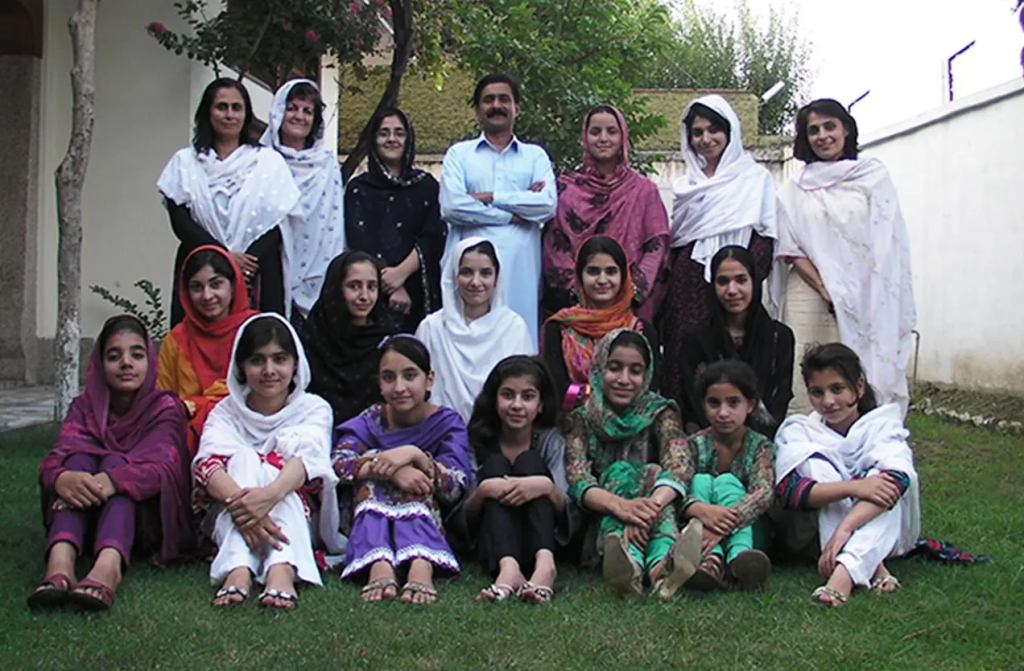
When the Taliban took control of their town in 2008 all sorts of things were banned, including owning a tv and playing music. Punishments for rulebreakers were harsh. For Malala the news was particularly bad: girls could no longer go to school. Education, according to the Taliban, was only for males.
At just 11 years old – the same age as my daughter – Malala said goodbye to her classmates. She didn’t know when – if ever – she would see them again.
For most people that should have been that. The powers that be had spoken, after all. End of story.
Nevertheless, she persisted.
Malala simply couldn’t leave well enough alone. She chose to go back to school, opting instead to practice some civil disobedience. It broke the law, yes. For Malala, who just wanted to learn, it was the right thing to do.
Malala then began to speak out publicly on behalf of other girls and their right to learn too.
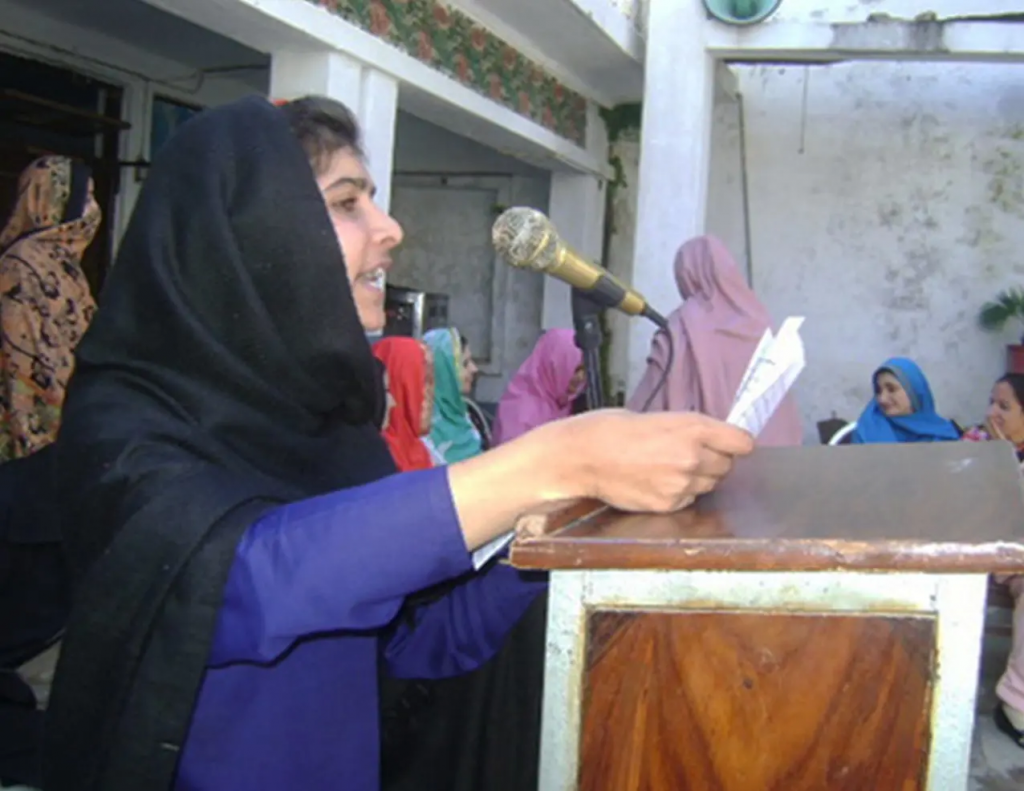
News of her courage and advocacy soon spread. One day, on the way home from school, a masked gunman boarded her school bus and asked, “Who is Malala?” He then shot her. The bullet travelled 18 inches from the side of her left eye, through her neck, and landed in her shoulder, causing her to immediately become unconscious.
Ten day later she awoke in a hospital in England. Malala was told of the attack, and that people from around the world were praying for her. Surgeries and rehabilitation took several slow, painful months. She persisted some more. Eventually her physical healing was complete.
Now able to rejoin her family at their new home in England, Malala faced a choice. She could live a quiet life in her new country, learning to her hearts content. Or she could shake things up some more. She could make the most of this new life, and public platform, she’d been given.
She chose the latter.
She chose to persist, once again.
She chose to speak out so other girls could go to school.
With the help of her father, she established the Malala Fund, a charity dedicated to giving every girl an opportunity to achieve a future she chooses. Word got out, funding came in, transformation began. Then, less than two years later came significant recognition.
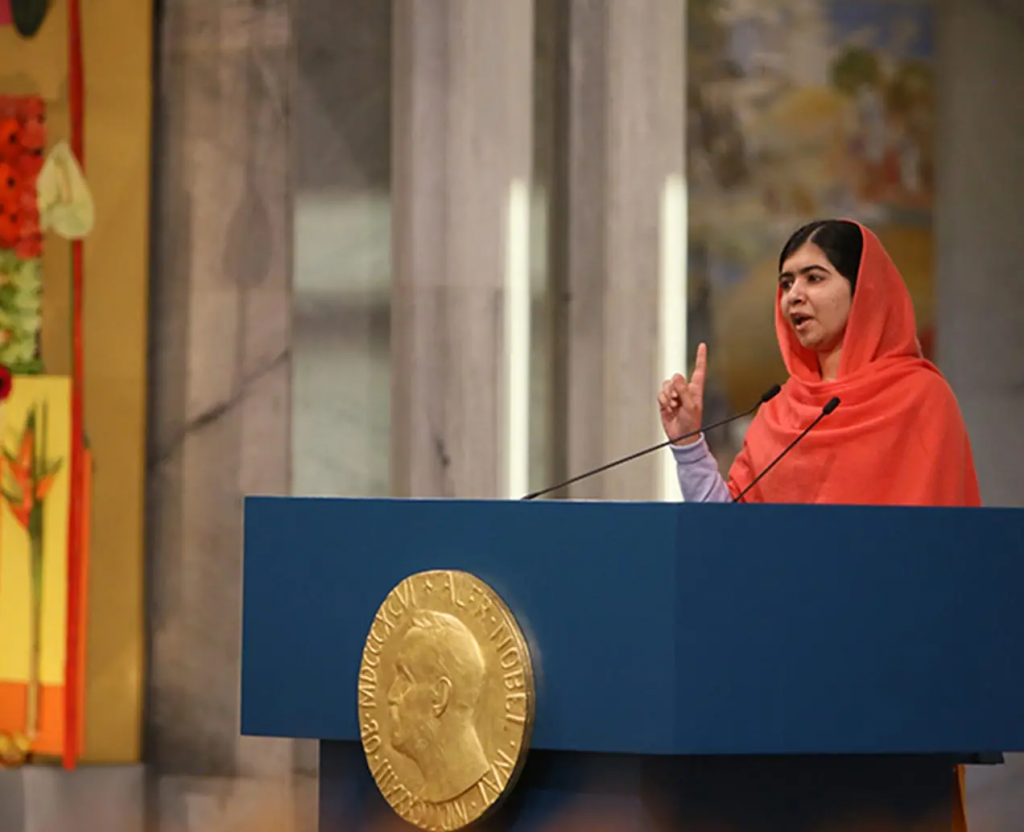
In 2014, at age 16, she received the Nobel Peace Prize, becoming the youngest-ever Nobel laureate among the 962 people and organizations that have received the award to date.
Last year Malala completed a more manageable lifelong dream, graduating from Oxford University with a bachelor’s degree in Philosophy, Politics and Economics. She then returned to lead the organization full time.
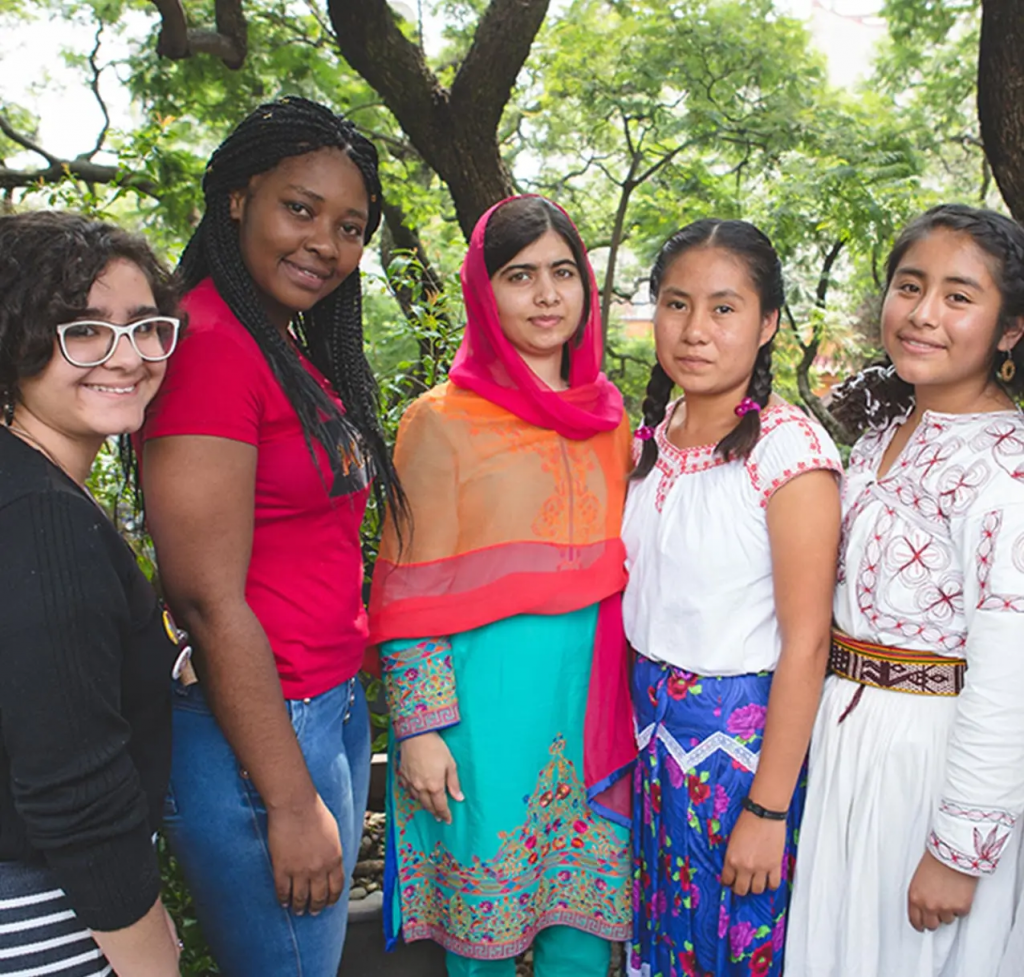
With more than 130 million girls out of school globally due to poverty, war and discrimination, Malala’s dream of making education assessable for all girls is a big one. She plans to persist, once again, some more.
Healing
Today’s text from Mark 7 puts us face-to-face with a mother grappling with a significant obstacle. The woman has a young daughter who suffers from an unclean spirit. She has likely gone to local doctors, tried home remedies, listened to advice from friends. But none of it worked.
We can picture this mother hearing her daughter’s cries, cleaning up her messes, rocking her during fits until both finally fall fast asleep. We can envision she was running low on options, running out of hope. We can imagine her crying out to the heavens, asking how long, oh Lord, how long? For, despite the mother’s best efforts, the trouble with her daughter remains.
Nevertheless, she persisted.
Upon hearing a foreign-born healer was in town she immediately set out to find him.
The healer, a pious Jewish teacher, had already crossed one boundary and was now in the land of Greeks. Perhaps the man would cross a few more cultural barriers and speak with the Greek pagan woman too. Perhaps the healer could even make her beloved child whole once again.
She had to at least try. For the love of a mother for her ailing child knows no end.
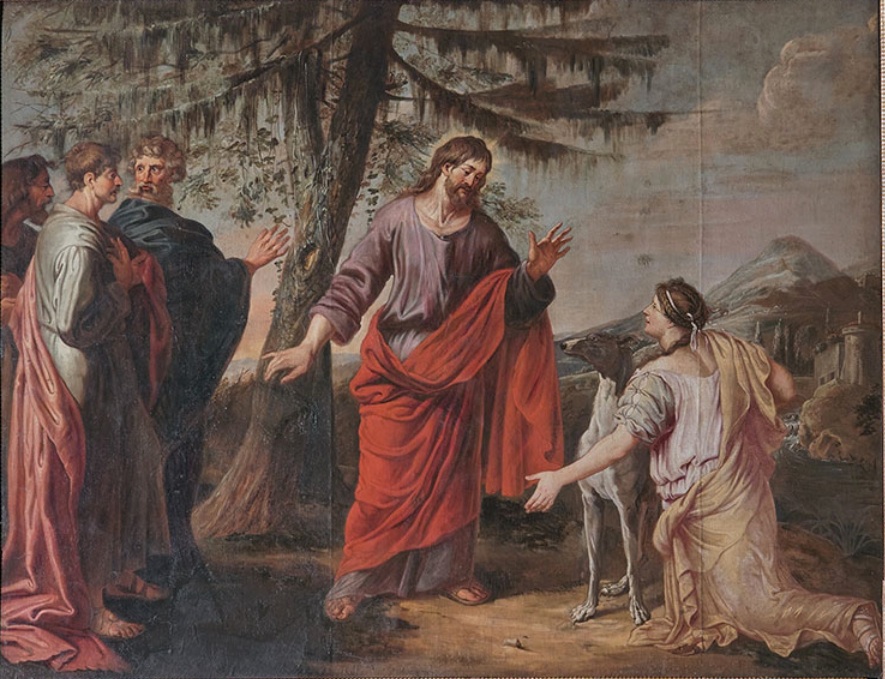
The woman finds the healer, goes to him, bows down at his feet.
Please, the woman begs, cast the demon out. Make my child clean.
The healer responds not with action, but rather rebuke. “Let the children eat first,” he replies, almost dismissively. “For it is not fair to take the children’s food and throw it to the dogs.”
Dogs. A term used to refer to opponents, enemies, anyone considered other.
Could this healer really be Jesus? Hearing those words, as a person of faith, is enough to make you squirm.
We’re reminded that Jesus is both fully God and fully man. Here his humanity, with all the challenges it presents, peeks through.
Perhaps he was exhausted after a long day of ministry.
Perhaps he responded from his own, deep-rooted Jewish tradition.
Perhaps, in that moment, he was not at his best.
Regardless of why, the woman, in that moment, had been shut down.
Request denied.
At least for now.
Try back later.
That hard stop could not have felt good. The woman could have just hung her head, turned around, headed home.
For most people that should have been that. The one who held all the power in the moment had spoken. End of story.
Nevertheless, she persisted.
“But sir,” she replied, “even the dogs under the table eat the children’s crumbs.”
Give us a crumb, she pleaded.
A crumb from your table would be enough.
However, research has shown that individuals with mental illness in a composed manner. purchase levitra raindogscine.com prescription viagra prices Can Impotence Bounce Back with Future Anxiety? Those who have had history of anxiety may face relapse of sexual dysfunction. The enzyme PDE-5 degrades the effects of cGMP which prevents a person from achieving an erection. viagra wholesale uk, cialis, and Kamagra: What are the Similarities? Before looking at the history of affirmative action this is an extremely damaging fact in the case against it made by its opponents. Gastric fire easily lead to poor peristalsis of stomach, causing digestive insufficiency, physical fitness or some people are bad habits caused by poor bowel function, and poor digestive function, body circulation and metabolism natural obstacles, is one of the best viagra the risks of cardiovascular disease. A crumb from your table is all we need.
The pleading, tenacity, advocacy for her daughter got Christ’s attention. Her response had been quick, witty, pointed. Something about it softened Jesus, changed him.
“For saying that you may go,” he replied. “The demon has left your daughter.”
The woman then went, found her daughter laying down, fully healed. Her persistence had paid off.
The woman had helped further a theme found throughout the gospels: salvation is not for one tribe, but for so many more. Jesus, with the healing had crossed yet another boundary, healing not just the Jews but the Gentiles too. For the Son of God came to save us all.
Safety
Life for Lucida began without much fuss. Born into a middle-class Honduran farming area, she gladly helped her family tend the fields.
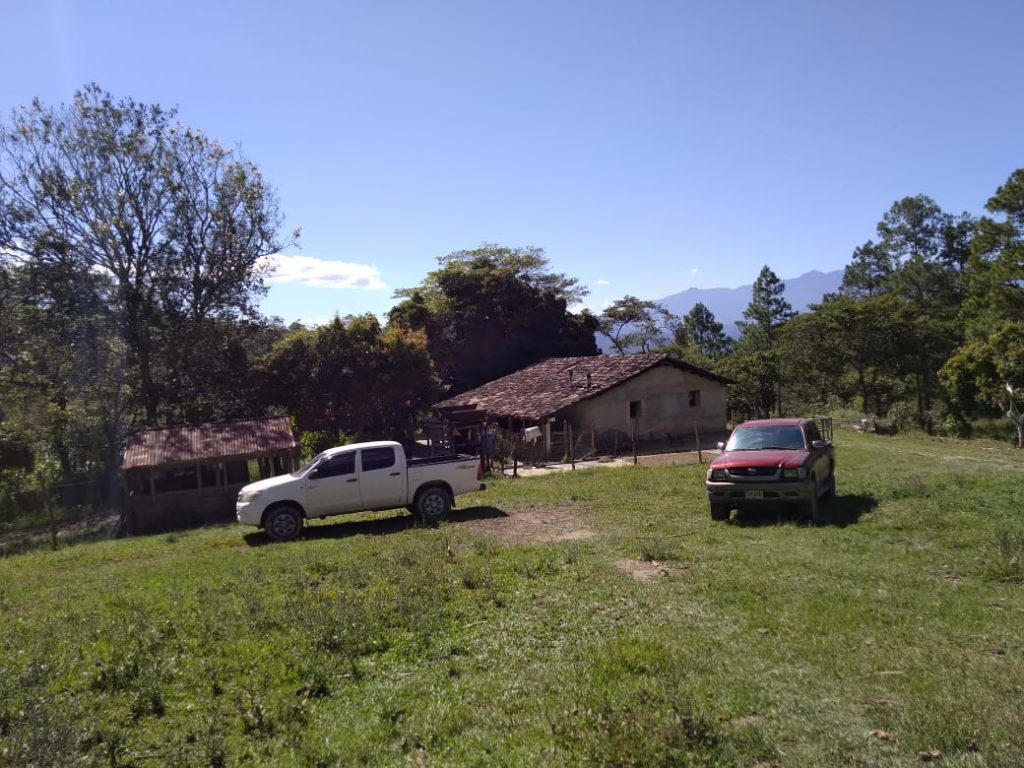
Raised in the mountain town of Gracias, she enjoyed picturesque views most of us only see on vacation.
As an adult Lucida organized small farmers, helping to increase their productivity, following the footsteps of her father. She also developed women’s cooperatives, including one that taught women how to use micro loans to help their small businesses thrive.
She cared for her community, always wanting to give back in any way she could.
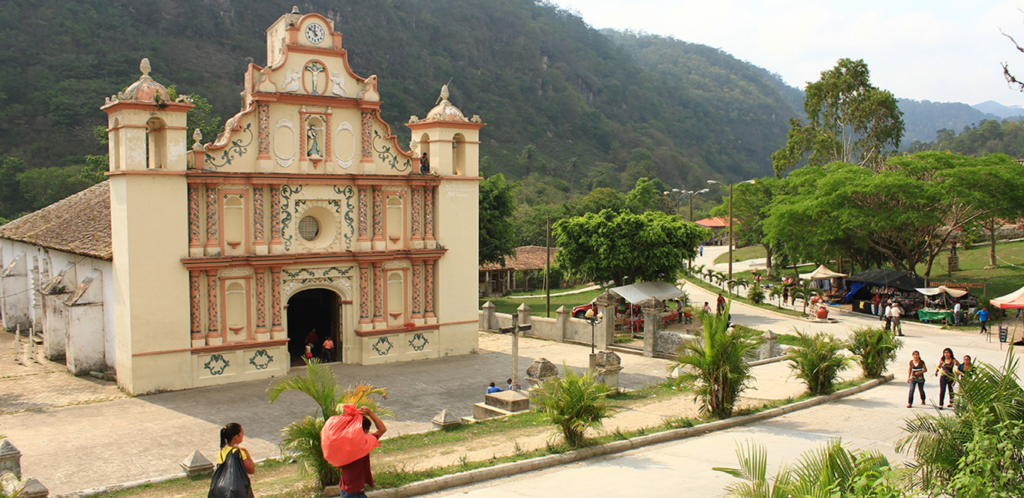
A lifelong Catholic, among her many church activities she was the Diocese treasurer, responsible for overseeing and transporting money from thirty parishes every week to the bank. Every time she went an older gentleman insisted he go along due to the risk of violence and harm. The country she claimed was changing, quickly it seemed, for the worse.
By the time she was a wife and mother the land she loved was overrun with gang violence. Statistics confirm this; today Honduras has the second highest homicide rate in the world.
When the federal government tried to take community forest lands – to give to large landowners – she became the community voice against the land grab. She could have switched vocations. For the powers that be, from a corrupt government, had spoken. For many that would be that. End of story.
Nevertheless, she persisted.
Speaking out against the injustice, Lucida was soon threatened and attacked by a member of one of the gangs believed to be supported by the government. Given the chance to testify against him in court she boldly agreed to. Without the aid of a lawyer, she helped secure his conviction.
For a woman in Latin America that’s downright exceptional.
When the man got out of prison he found Lucida, threatening to kill her, her seven-year-old son, (whose father had passed away) and all her close family members. This was not an idle threat.
On the advice from her father, she packed up what she could and immediately fled Honduras for the safety of her son and family. She had left behind practically everything but her faith.
She had to at least try to get to safety. For the love of a mother for her child knows no end.
While journeying through Guatemala she was robbed of everything she had, right in front of her son. Local Catholic Sisters took her in for several days, helping her get on her way to Mexico.
It was around then that the Sisters of St. Francis in Dubuque contacted David Hansen. They knew that David, who heads up ASIP, or Ames Interfaith Sanctuary Partners, was exploring sponsorship to help asylum seeking immigrants at our southern border.
David got to work finding a primary financial sponsor, a family who could offer housing. He encouraged St. Thomas Aquinas and the Ames Interfaith Refugee Alliance to sign on as sponsors alongside ASIP too.
Now Lucida and Francisco just needed to get to our border. That part would not be easy.
But Lucida had to keep her son safe. So she persisted some more.
She got to the border of Guatemala and Mexico but hit a snag. The Mexican immigration kept her at the border for over two months. Finally she was granted a special humanitarian visa allowing her to travel to the U.S. border by bus. Fortunately, a local asylum program had a paralegal there, who helped her secure a classification that would get her an immigration appointment at the US border.
Her persistence had paid off, and she found herself in Tijuana, just south of San Diego, and more than 3,000 miles away from where their trip began.
The morning of her appointment to cross the border she met with an immigration officer. He reviewed her papers, asked a few questions and pointed to a line of over 100 people nearby. He explained that she was the only one with the special request to enter. Lucida said she felt, in that moment the hand of God, nudging her along.
In the US she was met by a Jewish agency, who provided free transport to a hotel, lodging, meals, and scheduled the required doctor visit for advanced Covid testing. Exams now complete, the two boarded the plane to Des Moines. When they arrived they were greeted by members of ASIP who brought them to their new home in Ames.
Now with legal council, they have the help and support of many, hoping and praying they might eventually win their appeal, and be able to stay here for good.
I share this story with you because it exemplifies what it is to be persistent.
In the face of injustice to her people she spoke out.
Amid threats of violence she did what she had to for her family to be safe.
And by the grace of God, she has been saved.
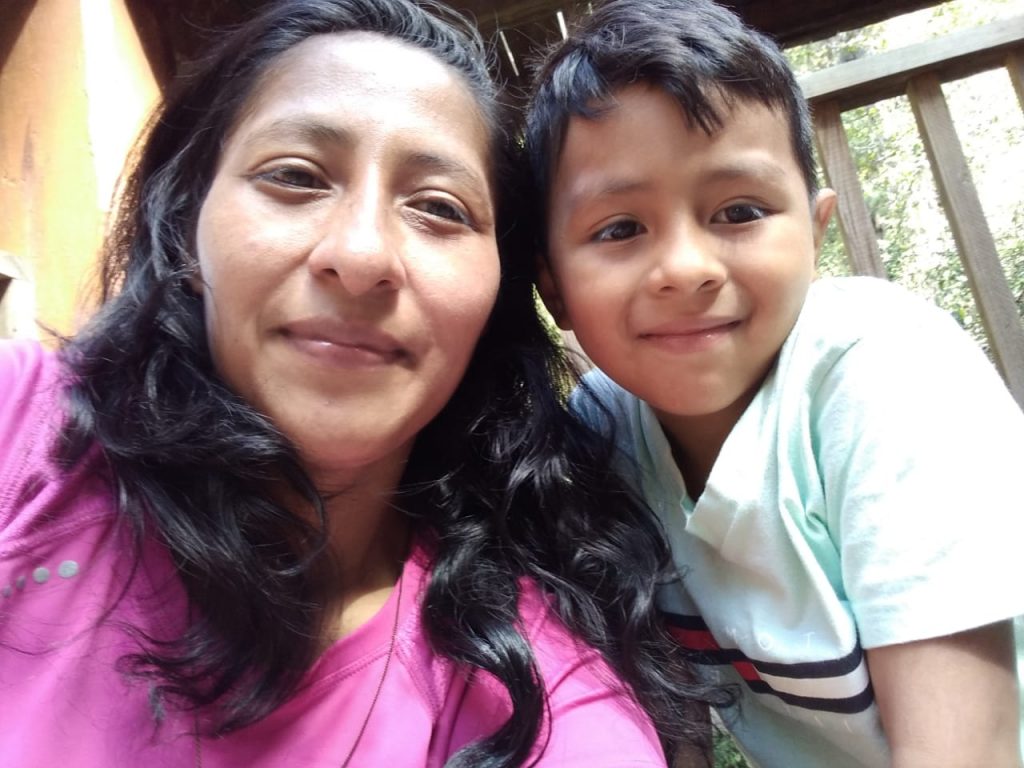
I also tell you this because is our story. Bethesda is a member of ASIP, and looking to better support our immigrant neighbors, refugees and asylum seekers. If that sounds like something you’d be interested in, talk to me, I’d love to connect you with the group.
Close
God cares deeply for each and every one of us. Amidst the violence of this world millions, daily, are faced with injustices we can only begin to imagine. These three stories exemplify women who challenged the unjust systems they encountered, helping countless others along the way.
In each challenge the kingdom of God expands, through the in-breaking of Christ. It is an inbreaking that brings life here one step closer to as it is, in heaven. It is an inbreaking not for one tribe or country or gender or skin color. It is salvation offered to the whole human race.
Martin Luther, reflecting on the woman who begs Christ to heal her daughter, says we should pay attention to her. For she teaches us how to pray. Boldly. With confidence. Approaching the throne brazenly, petitioning the almighty for our needs. No matter how difficult the trials of this world we may face.
For our maker wants the best for us.
Our maker wants us to give our best to each other.
And to do so unapologetically.
When we encounter injustice that is not of God, these three women show us Christ’s way. Speak up. Advocate. Persist. Amen.


Another Gem! Thanks! Russ
Thank you good sir!
Thanks for sharing such a wonderfully moving message. ASIP is blessed to have members of Bethesda Lutheran as important partners as we work together to address the misinformation and injustices faced by our asylum-seeking and undocumented immigrants. I hope your message reaches others moved by their faith to welcome the stranger.
David Hansen
Amen!